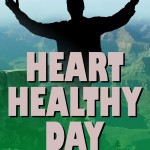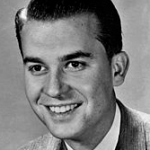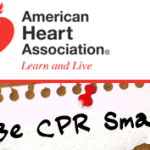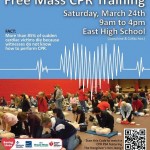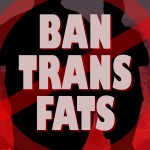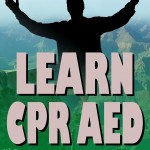
Keith Ahrens
Health tips and discussions, motivational articles and positive lifestyle coaching from Lifestyle Change Expert, Keith Ahrens
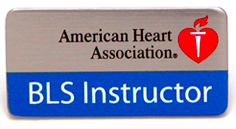 I just received my credential as a BLS Instructor from The American Heart Association.
I just received my credential as a BLS Instructor from The American Heart Association.
BLS stands for Basic Life Support. Many know it as CPR, AED, Choking, & First Aid Training
As a BLS Instructor for the AHA, I can teach new and renewal classes for CPR/AED/Choking/First Aid to Medical Personnel and the General Public throughout the United States.
I’ve strongly advocated that more people need to be trained in proper CPR (Cardio Pulmonary Resuscitation) techniques and the use of an AED (Automated External Deliberator) and now I can help them accomplish this.
Knowing proper techniques and what to do in an emergency saves lives. As frightening as an emergency situation would be – not knowing how to respond would be more frightening and significantly reduce victim’s chances of survival.
You, Yes You, Can Save a Life!
Are you CPR/AED trained? If not, call your local AHA office and find a training center near you. – Keith
Click Here to go to the American Heart Association Page and get more info
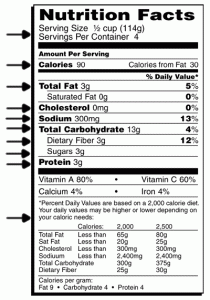 With National Nutrition Month in full swing it seems like the perfect time to get reacquainted with the Nutrition Facts on food labels.
With National Nutrition Month in full swing it seems like the perfect time to get reacquainted with the Nutrition Facts on food labels.
The FDA has a very easy to read Food Label fact sheet.
Click here for Food Label info from the (USFDA) Food and Drug Administration
In recent years I’ve become obsessed with reading food labels.
I simply can’t tell you how many items I pick up in a grocery store, read the label, and put back on the shelf.
When you learn to read labels, it only takes a split second to identify 90{1ee8873d3da54571ef77633feec9b2f18618b0dba2f28faf42edb28003d1c6f7} or more of unhealthy foods and ingredients.
The two primary ingredients that I Zoom In and Zoom Out on are Saturated fat and Sodium. If these two items are out of whack, the item goes back on the shelf. Saturated fat and Trans fats are not healthy fats.
The key with Total fat in a product is the make up of the fat. There are typically 4 possibilities including: Saturated Fat, Trans fat, Mono-unsaturated and Poly-unsaturated fats. In general, the latter of the two being primarily healthy fats.
Make no mistake that our bodies need fats to survive but it’s the type of fats that are either heart healthy or heart destroying.
The goal with the healthy fats is to consume and use them in moderation because of their high caloric content.
If an item has ANY Trans fats put it back on the shelf immediately.
Everything has importance on a food label. Take a close look at sugars, carbohydrates, dietary fibers and protein. Depending on what your nutritional and dietary goals are you’ll pick up certain foods with higher concentrations of certain ingredients.
Learn to read food labels and Learn to Live – Keith
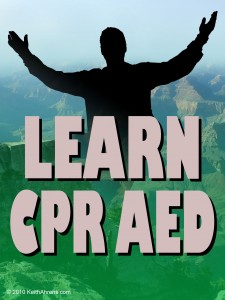 Probably and Perhaps.
Probably and Perhaps.
Another High School athlete passed away in what appears to be another case of Sudden Cardiac Arrest (SCA).
The initial autopsy revealed an enlarged heart.
Click Here To Read Full Article
What we do know is that a routine screening of this athlete may vary well have shown his enlarged heart and flagged his potential risk of SCA. An echocardiogram (Sonar) and/or electrocardiograms (EKG) most likely would have discovered the abnormality.
Why are we caught so off guard when these deaths occur?
While advocating for prevention, awareness, and education programs for heart disease and the screenings of athletes in high school and college sports, I’ve learned that although the early detection tests are simple and easy to administer, they’re simply not routinely performed.
Why? I’ll share a couple reasons I’ve learned.
Cost. Although the cost is very small to have the test(s) performed, the tests must also be read and interpreted by a doctor.
Accessibility. Screenings need to be very accessible and easier to get.
Athletes are afraid that if they admit to having a risk factor (such as a family member with heart disease) they may not be allowed to play. Studies have shown that athletes may not be truthful in answering the most basic risk factor questions.
Statistics are weak at best for the scope of the problem. The facts, I believe, would show this is a much larger problem than we’re aware of.
Routine screenings of groups of athletes regularly identify potential at risk youth.
We need to ask: Should all athletes be screened?
Who should pay for the screenings?
My personal opinion is that every high school and college athlete should be screened. It would logically begin with the students with the most basic primary risk factors such as family history.
How do we get an athlete to tell the truth? If a problem is found, is that the end of the athlete’s sports career? Will they ever be allowed to compete again?
Do we allow doctors to clear someone to compete and relieve the doctor of potential lawsuits if a problem occurs?
One person making a difference and saving lives is my friend Holly Morrell of Heartfelt Cardiac Projects based in California. Her non-profit offers low cost screenings with any abnormal or concerning findings being referred to a physician. She has inevitably saved countless lives with her work.
The one thing I know for sure is that routine screenings save lives. I’ll continue my fight for Awareness, Prevention, and Education of Heart Disease and the related risk factors. – Keith
 I’ll be attending the Touro University Annual Health Fair this Sunday March 6 from 10am – 3pm.
I’ll be attending the Touro University Annual Health Fair this Sunday March 6 from 10am – 3pm.
This is a great opportunity to get free health screenings and enjoy some wonderful expert speakers and seminars.
Over 1000 are expected to participate.
I’ll be volunteering in the American Heart Association booth.
Touro faculty and students will also be providing health screenings and demonstrations at stations throughout the fair.
These screenings and demos will include:
• Feet screening for orthotic issues
• Speech and language screening
• Blood pressure and blood glucose screening
• Diabetic Foot check screening
• Sudden Cardiac Arrest in Adolescents screeningOsteopathic Manipulative Medicine demonstrations
Click on the link for more information. TOURO UNIVERSITY HEALTH FAIR Information
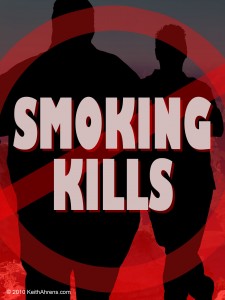 OK, so I had a craving for Sushi.
OK, so I had a craving for Sushi.
I was on the other side of town and I decided to try a place that I used to go and eat Chinese food. I haven’t been there for years. The food was always excellent and fresh. Their Sushi, yes they also had a wonderful Sushi bar, was also excellent.
It was early afternoon and most places have low priced “Happy Hours” with great deals. This place was no exception. When I walked in, the host greeted me and I asked him about the “Happy Hour” Sushi specials. He said that all Sushi was 30{1ee8873d3da54571ef77633feec9b2f18618b0dba2f28faf42edb28003d1c6f7} off from 2 – 4pm. Not bad I thought. Spicy Tuna Roll here I come.
Then, he pointed to the bar area and not the Sushi bar. He said that the special was only good in the bar area and not the restaurant or Sushi bar.
You see in Las Vegas, if the restaurant has a bar area and smoking is permitted, the bar must be enclosed and sectioned off by glass from the other part of the restaurant where food is served. Casinos are exempt from the statute. It was part of the Nevada Clean Indoor Air Act.
I told the host that I was allergic to smoke and could never sit in the bar area, much less a smokey enclosed space. To me, it was like an oxygen tent filled with smoke. I told him that I couldn’t be around second hand smoke because of the immanent health dangers. I thought I was making excellent headway.
I asked him if I could sit at the Sushi bar inside the restaurant (only 30 feet away). I was able to see only one person was at the Sushi bar and there were several people sitting in the bar, smoking. He politely said that’s not possible.
I said thank you and left without getting my Sushi.
Now you may draw your own conclusion. The ones I was thinking of were:
1. It’s my choice as to weather to patronize a business.
2. What the F___ was this guy thinking letting a paying customer walk out of his business.
3. Smoking and second hand smoke kills and I had to send a message to this business that some people can’t tolerate the smoke, nor wish to be around it, and he should have let me sit at the Sushi bar.
4. Second hand smoke is a risk factor for many chronic diseases and cancers and not just limited to heart disease.
If you smoke, Quit. If you need help quitting, talk to your doctor, local hospital, or search for a smoking cessation program.
I hate cigarettes, I hate smoke, I hate second hand smoke, I hate ashtrays, I hate smoker’s breath, and I hate everything about smoking. – Keith
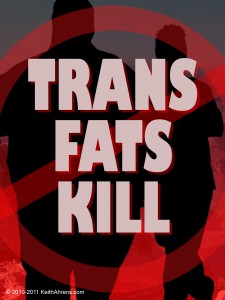 One of the hottest legislative issues coming up in many states is the “Ban” or elimination of trans fats in foods in the school systems and restaurants.
One of the hottest legislative issues coming up in many states is the “Ban” or elimination of trans fats in foods in the school systems and restaurants.
Some states and cities have already paved the way to ban this deadly type of fat.
I asked at a recent advocacy event, “Why are we even having this discussion about trans fats?” I was just a little frustrated.
What makes it more interesting is that trans fats can be substituted in most cases with healthier oil alternatives. I have a chef in the family and know how creative he can get to make food taste good and be healthy.
Trans fats are directly related to cardiovascular disease. Trans fats are the worst kind of fats for our bodies to ingest. Trans fat raises your “bad” (LDL) cholesterol and lowers your “good” (HDL) cholesterol.
Trans fats were created to give food a longer shelf life. Adding hydrogen to vegetable oil through a process called hydrogenation creates Trans fat. It made the oil thicker and more solid. Think about what that does to your arteries, Yuck!
With obesity levels sky high along with elevated risk factors like blood pressure, diabetes, and higher cholesterol, we can’t afford not to lobby our legislatures to take action.
PTA’s around the country should be at the forefront of eliminating trans fats from their schools.
There are many bakeries popping up that don’t use trans fats in their products. The next time you go to the store read the label. If you’re unsure, ask if the product contains trans fats. Look for the words “partially hydrogenated” vegetable oil or shortening. Those are often code words for trans fats.Soon,
I hope the day will come where trans fats are simply an entry about poor nutrition in our history books. – Keith
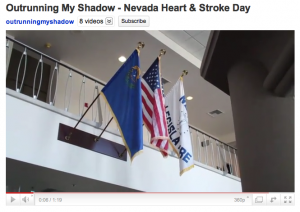 Nevada Heart & Stroke Day was held at the Nevada State Legislature and Capitol.
Nevada Heart & Stroke Day was held at the Nevada State Legislature and Capitol.
I bought my flip cam and shot some video and put together a short trailer on YouTube.
Click here to watch the YouTube video
The American Heart Association coordinated the event.
Advocates from many different fields advocated legislative action to the Governors office, our State Senators, and Assemblymen.
The 4 key legislative initiatives we lobbied for were:
1. Childhood Obesity – Removing foods containing trans-fats from the schools in Nevada.
2. Childhood Obesity – Improve nutrition and physical activity/education during and after school and childcare programs. Support statewide school wellness policies and help schools adhere to the program. Support school playgrounds and athletic fields for use by community and non-profits.
3. Tobacco Control – Increased price of tobacco products, limiting exposure to second hand smoke and funding to cover cessation programs and services.
4. Stroke Quality and Availability of Care – Support state level recognition of certified stroke centers and coordinated systems of care for stroke in Nevada.
Click here to watch the YouTube video
Please feel free to share the link.
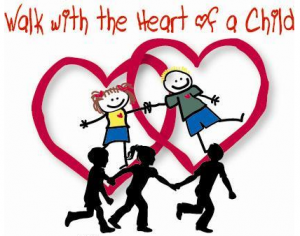 On Saturday I’ll be walking in the Children’s Heart Foundation Heart Walk in Las Vegas for kids born with congenital heart defects.
On Saturday I’ll be walking in the Children’s Heart Foundation Heart Walk in Las Vegas for kids born with congenital heart defects.
This foundation does some great work to help the children and families effected by and living with Heart Disease.
When I meet children survivors, it really hits your heart, both literally and figuratively. These are amazing children who I admire for their strength and resilience. Being around them really makes you stronger. They have that natural way to uplift and inspire you. We can always use Inspiration!
I salute these kids for their courage.
From the Children’s Heart Foundation Website
About Our Organization
Heart problems in children are surprisingly common. They are, in fact, the most common type of birth defect and the number one cause of death during the first year of life. Nearly twice as many children die from congenital heart disease in the United States each year as die from all forms of childhood cancers combined.
In Nevada alone, more than 350 children are born each year with significant heart disease requiring either intensive medications or surgery. An additional 150 to 250 of Nevada’s children and newborns may develop a heart problem due to infections, Kawasaki disease or Rheumatic fever. Hundreds more will exhibit problems with heartbeat irregularities requiring medications or specialized procedures.
Children’s Heart Foundation is committed to making a positive difference in the lives of children with heart conditions throughout Nevada. We empower heart families through emotional, educational and financial support to inspire a higher quality of life for all.
The Foundation has three main goals:
1. To provide a carefree camp experience for children with heart conditions
2. To educate healthcare professionals and the general public on pediatric cardiology issues
3. To lend support to families as they deal with the emotional and financial toll exacted by a child’s heart problems
 On Thursday, February 24, I’ll be going to our State Capitol along with other advocates from the American Heart Association, Health Care Providers, Insurance Companies, the Medical Community and Citizens.
On Thursday, February 24, I’ll be going to our State Capitol along with other advocates from the American Heart Association, Health Care Providers, Insurance Companies, the Medical Community and Citizens.
We‘ll gather in Carson City, Nevada to celebrate Heart & Stroke and Wear Red Day at the Legislature.
Events will be held throughout the day to educate and raise awareness of Heart Disease, Stroke, Obesity, Smoking and the other related chronic diseases and risk factors.
Throughout the day and afternoon, we’ll visit with our elected officials to encourage their support of pending legislation that will improve the lives of the citizens of Nevada.
I’m a firm believer that by investing now on awareness, prevention and education programs and initiatives to the citizens of Nevada and around the country the cost savings to the states down the road will be far less than if we do nothing. I say, “Act Now”.
Some of the events taking place are below:
Hands Only CPR Demonstration by REMSA Begins
Speaker: Sudden Cardiac Arrest Among Youth
Speaker: Life’s Simple Seven
Speaker: Go Red For Women
Speaker: Fighting Childhood Obesity
Speaker: Tobacco and Heart Disease/Stroke
Speaker: Issue Overviews
Speaker: Preventing Atherosclerosis
Legislative Office Meetings
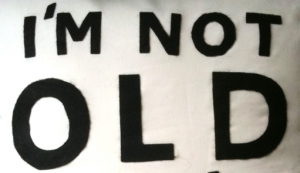 I’ve recently taken a few classes at the gym to mix up my workout routine such as Zumba, BodyPump, and Spin.
I’ve recently taken a few classes at the gym to mix up my workout routine such as Zumba, BodyPump, and Spin.
